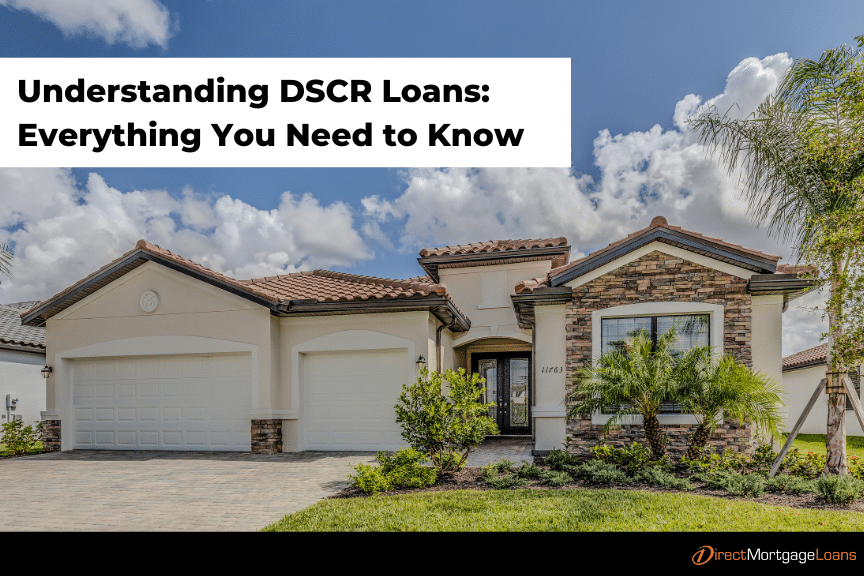What is debt service coverage ratio (DSCR)?
Debt service coverage ratio, or DSCR, is a financial metric that is used to measure the ability of a real estate investment property to generate enough cash flow to cover its debt payments. Lenders use this ratio to calculate the maximum loan amount that can be extended to a borrower based on the property’s ability to generate sufficient revenue to cover their mortgage payments.
Subscribe to our blog to receive notifications of posts that interest you!
How is DSCR Calculated?
DSCR is calculated by dividing a property’s net operating income (NOI) by its total debt service. Net Operating Income (NOI) is the property’s annual income minus its operating expenses, such as property taxes, maintenance, and insurance. Total debt service includes all the property’s debt obligations, such as mortgage payments, interest, and other debt-related expenses.
The resulting ratio is expressed as a decimal or percentage, with higher ratios indicating that the property is generating enough cash flow to cover its debt payments. Generally, a DSCR of 1.25 or higher is considered acceptable by most lenders.
Calculating DSCR
To calculate DSCR, the following formula is used:
DSCR = Net Operating Income / Total Debt Payments
For example, if a borrower has a net operating income of $50,000 and total debt payments of $40,000, their DSCR would be calculated as follows:
DSCR = $50,000 / $40,000
DSCR = 1.25
What would be a good DSCR ratio?
A good DSCR varies depending on the type of property and the lender’s requirements. Generally, a DSCR of 1.25 or higher is considered favorable for investment properties. Some lenders may require a higher DSCR, especially for riskier investments. It’s important to consult with your loan officer to determine specific requirements for the property in question.
Types of DSCR Loans
There are several types of DSCR loans available to borrowers, including fixed-rate loans, adjustable-rate loans, and interest-only loans. Fixed-rate loans offer a stable interest rate over the life of the loan, while adjustable-rate loans may have a lower initial interest rate but can fluctuate over time. Moreover, interest-only loans allow the borrower to pay only the interest on the loan for a set period before starting to pay down the principal.
What is a DSCR loan program?
A DSCR loan program is a type of loan that’s specifically designed for real estate investors who want to purchase properties with a high debt service coverage ratio. These loans are typically offered by lenders who specialize in commercial or investment property financing, and they often have more stringent underwriting requirements than traditional residential mortgages.
Learn about Direct Mortgage Loans DSCR Loan Programs!
Who should consider a DSCR loan?
DSCR loans are primarily designed for individuals or businesses who are looking to finance their investment properties. These loans are particularly useful for investors who may not qualify for traditional mortgage financing due to their debt-to-income ratios or credit scores.
Generally, investors who are looking to purchase vacation rentals, multifamily homes, or investment properties may consider a DSCR loan. This is because these types of properties are typically valued based on their ability to generate rental income, and the DSCR metric is used to assess this income potential.
Connect With A DSCR Lender To Learn More
What are the requirements for the DSCR program?
While this will vary depending on the program and lender, here are some of the general requirements.
- Debt Service Coverage Ratio: In general, most lenders seek a debt service coverage ratio of 1.25, which signifies that the property earns 25% more than its complete payment.
- Property Type: The type of property must be capable of generating income, such as rental property, commercial property, or multifamily property.
- Cash Reserves: Some lenders may require the borrower to have sufficient cash reserve to account for unforeseen costs or unfilled rental units in the property.
- Property Value: The home appraisal value of the property is a key factor that lenders consider when determining the loan amount and the borrower’s eligibility for the loan. If the appraised value of the property is less than the outstanding loan balance, it may decrease the likelihood of the lender approving the loan.
- Credit Score: The minimum credit score needed to qualify for a DSCR mortgage can vary depending on the lender and other factors, but usually a credit score of 620 or higher is required.
How do a DSCR loan work?
DSCR investor loans work by using the property’s cash flow to determine its borrowing capacity. Lenders will typically require a minimum DSCR of 1.25 or higher, and they’ll also consider other factors such as the property’s location, type, and condition.
Why is DSCR important for real estate investing?
When it comes to real estate investing, DSCR is particularly important in evaluating the profitability of a property. A high ratio indicates that the property generates enough income to cover its expenses and debt payments, making it a good investment opportunity. On the other hand, a low ratio may indicate that the property is not generating enough income to cover its expenses and debt obligations, making it a high-risk investment.
Are DSCR loans hard to get?
Obtaining a DSCR loan could be easier than other types of loans because the approval process is based on the property’s income rather than the borrower’s financial situation. This can make it simpler to get approved for the loan, and the application process is often more streamlined with fewer strict requirements. Nonetheless, it’s important to note that the specific criteria and ease of approval can vary depending on the lender and the borrower’s individual circumstances.
What are the advantages of a DSCR loan?
- Lower Risk: Considered less risky to lenders because the borrower must demonstrate that the property generates sufficient cash flow to cover the loan payments. As a result, lenders may offer lower interest rates and longer repayment terms.
- Larger Loan Amounts: Since DSCR loans are based on the property’s cash flow rather than the borrower’s creditworthiness, borrowers may be able to secure larger loan amounts.
- Easier Approval Process: Generally easier to obtain than traditional loans because the lender’s focus is primarily on the property’s cash flow rather than the borrower’s credit history.
- Better Investment Returns: By using leverage to purchase a property, investors can potentially earn higher returns on their investment than they would by paying cash.
- Increased Cash Flow: If the property’s cash flow is greater than the debt service payments, the borrower will have additional cash flow that can be used for other investments or expenses.
What are the downsides of a DSCR loan?
- Higher Equity Requirements: Primarily based on the property’s cash flow, lenders may require stricter requirements than traditional loans. This means borrowers may need to put more money upfront to secure financing.
- Limited Flexibility: May have stricter terms and conditions than traditional loans, which could limit a borrower’s flexibility. For example, the loan may have a pre-payment penalty or restrictions on refinancing.
- Limited Availability: DSCR loans may not be as widely available as traditional loans, particularly for smaller properties or in certain markets.
- Higher Costs: Possibility of higher interest rates and fees than traditional loans, particularly if the property’s cash flow is not strong enough to meet the lender’s requirements.
- Risk of Default: If the property’s cash flow is not sufficient to cover the loan payments, the borrower may be at risk of default, which could result in foreclosure.
Factors that affect DSCR
Several factors can affect a property’s DSCR, including rental income, property expenses, and vacancy rates. Rental income is the primary source of income for a property, so higher rental income leads to a higher DSCR. Additionally, property expenses, such as maintenance costs, property taxes, and insurance, reduce the net operating income, leading to a lower DSCR. Furthermore, vacancy rates can also impact DSCR, as vacant units generate no rental income.
Qualifying for DSCR Loan
To qualify for a DSCR loan, the income-generating property must generate sufficient cash flow to meet the lender’s coverage ratio requirements. However, the specific coverage ratio required can vary depending on the lender and loan type, and there may be other eligibility requirements that must also be fulfilled.
How can I apply for a DSCR loan?
To apply for a DSCR loan, follow these general steps:
- Connect with a lender: Contact a Direct Mortgage Lender to discuss your financing needs and start the process.
- Submit your application: Start your loan application by filling out the necessary forms. You can apply easily (and securely) from your desktop or mobile phone using the DML App!
- Submit proof of income from your property: Provide proof of income generated by the property you are using as collateral. This could include rental income statements, lease agreements, and other relevant documents.
- DSCR calculation and 1007 rent schedule: The lender will use the information you provide to calculate the property’s Debt Service Coverage Ratio (DSCR) and a 1007 rent schedule. These calculations will help the lender determine the maximum loan amount you qualify for.
- Approval & Closing: If your application is approved and you agree to the loan terms, you will move on to the closing stage, signing the necessary documents and receiving the loan funds.
Eligibility and approval is subject to completion of an application and verification of home ownership, occupancy, title, income, employment, credit, home value, collateral and underwriting requirements. Direct Mortgage Loans, LLC NMLS ID# is 832799 (www.nmlsconsumeraccess.org). Direct Mortgage Loans, LLC office is located at 11011 McCormick Rd Suite 400 Hunt Valley, MD 21031. Equal housing lender.






Leave A Comment
You must be logged in to post a comment.